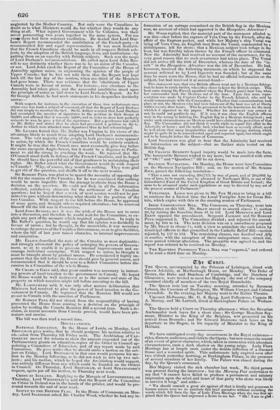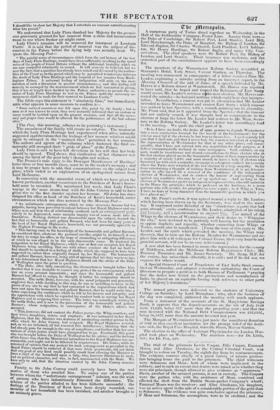We have catalogued every-day occurrences in the Royal existence— rides,
dinners, audiences, and visits to the Opera ; but now conies the record of an event of graver character, which, taken in connexion with attendant circumstances, casts a dark shadow on the young reign. Lady Flora Hastings has at length sunk under the double infliction of a diseased frame and a wounded spirit. This unfortunate lady expired soon after two o'clock yesterday morning, at Buckingham Palace, in the presence of several members of her family. The Palace was closed during the day, by the Queen's command.
Her Majesty visited the sick chamber last week. No third person was present during the interview ; but the Morning Post undertakes to say that " it cannot have failed to produce a permanent and salutary impression upon the mind and heart of that party who alone was likely to survive it long," and adds- " We should commit a great sin against all that is kindly and generous in human nature were we to conclude this brief narrative without recording the words which fell from the lips of Lady Flora Hastings when she was first ap- prised that the Queen hail expressed a desire to see her. 4' Oh! I am so glad
I shouldlike to show her Majesty that I entertain no rancour notwithstanding what has passed."
We understand that Lady Flora thanked her Majesty for the permis- sion graciously granted for her removal from a close and inconvenient room to one where fresher air might enter. Lady Flora's remains will be removed for interment at Loudoun Castle. It is said that the period of removal was the subject of dis- cussion in the Palace before the dying lady was actually dead. We quote the Morning Post- " The painful series of circumstances which form the sad history of the last days of Lady Flora Hastings, would have been sufficiently revolting to the moral sense of the people of Great Britain without the additional brutality which we are now compelled reluctantly to record. It will scarcely he believed, but we aver the fact, that a question has already been raised and dismissed by theauthor- hies of the Court as to the period which may be permitted to intervene between the death of Lady Flora Hastings and the removal of her remains from Buck- ingham Palace. A universal feeling of indignation will arise on the mere tnention of such a discussion in present circumstances ; and this feeling svill • searecly be assuaged by the announcement which we feel warranted in giving, that it has at length been decided by the Palace authorities to permit the re- mains of Lady Flora Hasstings to rest in the Palace until the necessary ar- rangement shall be made for their removal to Loudoun Castle." The Globe says this statement is " absolutely false," but immediately adds what appears in some measure to confirm it- " Some natural uneasiness was felt upon this point by the family ; but as soon as it was known to exist, they were instantly informed that no custom or usage would he iusisted upon on the present occasion, and that all the neces- sary and proper time would be allowed for the performance of the last solemn rites."
[The Post, this morning, adheres to its yesterday's statement.]
The uneasiness of the family will create no surprise. The treatment which the Lady Flora Hastings had experienced when alive, naturally suggested apprehensions that the feelings of her nearest relatives might again be outraged in the " maimed rites" permitted to her remains. The authors and agents of the calumny which hastened the fatal ca- tastrophe still occupied their " pride of place" at the Palace. Lady Flora is said to have left directions in her will that her body should be opened. This; shows that vindication of her character was among the latest of the poor lady's thoughts and wishes. The Premier's rude reply to the Dowager Marchioness of Hastings' letter three or four months since, must be in the reader's memory ; and it may be proper here to add, that communications on the subject tools place, which ended in an explanation of an apologetical nature from Lord Melbourne.
In connexion with the mournful event, of which we have given the known particulars, another occurrence in the Dittchcss of Kent's house- hold must be recorded. We mentioned last week, that Lady Flora's voyage in the' same steam-boat with Sir John Conroy is said to have given rise to the first slander against her honour. Sir John has since resigned his office as head of the Dutchess of Kent's household, under circumstances which are thus narrated by the _Morning Post- " An unfortunate estrangement, which on some occasions became but too palpable, having been perceived to subsist between her Royal Highness and one tvhoss non and dear ties of relationship rendered such an cgtssageelset cularly to he deprecated, sonic anxious inquiry was of course made into its foundation. Nothing distinct was discoverable upon the subject, beyond the fact that an honourable and gallant Baronet, who had been for many years at the bead of her Royal Highness's household, was not personally agreeable to the Highest Personage in the realm. " This having come to the knowledge of the honourable and gallant Baronet, lie considered that, whatever the personal sacrifice might be to himself; it was his duty to resign his Office, ill the hope of reconciling or mitigating dilferences of which lie was alleged to be the only discoverable cause. lie tendered his resignation to her Royal Highness ; which was at first not accepted, her 1:oval Highness being unwilling that one with whose conduct she had no thult to find should be sacrificed to a feeling of dislike which she supposed to have been suggested to, rather than originally formed by, her Majesty. lihe honourable and gallant Baronet, however, being still of opinion that his duty was to resign, it was determined that her Royal Highness should ask the advice of the Duke of Wellington upon the point in question. " The Duke, after fully considering the circumstances brought before him. decided that it was desirable to remove any pretext for an estrangement, which was on every account lamentable ; and since the honourable and gallant Baronet had offered to resign, Ile thought it better his resignation should lie accepted. The noble Duke, however, with his usual judgment and generosity, suggested that, while deciding in this way, he was SO unwilling to leave in the power of any one to say that he had concurred in the imputations which had been cast upon the honourable and gallant Baronet, that he would write him a letter expressing the confidence which he felt in his honour and integrity, and the approbation with which he regarded his conduct both in serving her Royal Highness and in resigning that service. The letter was accordingly- written by
i
the noble Duke, and is now in the possession of the honotnuble and g,allant Baronet ; whose resignation, in consequence of the Duke's advice, was accepted.
" This, however, did not content the Palmy party—the Whig courtiers, and their wives, daughters, sisters, and employes. It was intimated to her Royal Highness, that the Minister was desirous of nominating smother person to the office which Sir John Conroy had resigned. Her Royal Highness resisted, and, as we are informed, all but resented this interference ; thinking that she had already gone far enough in the way of compliance, and further than her own notions of strict justice would have prompted her to go. Eventually this point also was brought before the Duke of Wellington for his advice; and the decision of his Grace was, that the Ministerial intimation to her Royal !lightness was un- reasonable, and ought not to be followed by acquiescence. His Grace, while lie remained of opinion that any pretext for such estrangement as prevailed in the Royal Palace should be removed if that were tifirly practicable, did not think that any goad of any kind could possibly result from allowing the Minister to force a chief of the household upon a lady, who however illustrious in rank, had no political character, and was, in fact, unconnected with the State. We have only to add, that the situation vacated by Sir John Conroy remains vacant.
Fnmity to Sir John Conroy could scarcely have been the real motive of those who assailed him. To annoy one of the parties between whom the " unfortunate estrangement" subsists, was the wish of persons who have industriously fomented the difference. The scheme of the parties alluded to has been hitherto successful : the feelings of the Dutchess of Kent have been deeply wounded, one member of her household has been banished, and another brought to an untimely grave.



























 Previous page
Previous page